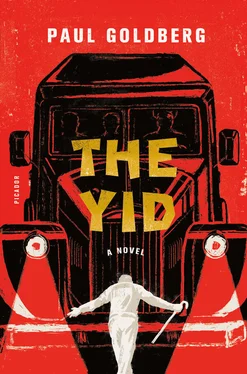He listens for a splash, then, once again, the sack … the edge … a push …
Two hapless thugs join Lieutenant Narsultan Sadykov and his soldiers, to stand eternal guard in frigid waters. After the second splash, Kima bows her head, not out of grief (she feels none), but as some mysterious punctuation.
Lewis lacks remorse as well. His stomach does not constrict; his vomit has been cast upon these waters. He has no more.
* * *
As the waters close above Kent and Tarzan, Lewis stares down the well. Five corpses lie beneath him. This is his moment of reflection upon their death, upon his life. He can still feel. Or can he?
The girl stands next to him in silence, so close. Her hands are on his back. He raises himself from his weird genuflection and turns around to face her. As their hips meet, her torso moves tensely back, as do her lips. He sees this as an invitation to follow her, and so he does, toward the dacha.
A good strong yank is all it takes to open the dacha’s door. They are inside, their sheepskin coats still on. His hands move upward from her waist to her small breasts as her lips tremble against his. He stops the movement of his hands to let her trembling stop, and stop it does.
If you have lived unscarred, you’ll have to go through some contortions to understand this, but understand you will. He feels her edge, her boundary of feeling, her shore of the unknown.
And Kima knows the boundaries of Lewis’s knowledge. The void of feeling engenders feeling, too. That night, Kima Yefimovna Petrova, the daughter of a martyred Commissar, chooses to place her trust in a Negro named Lewis. A rootless Negro and an orphaned Jewess; can God conceive of a more equitable match?
And so they stand in an embrace, their sheepskin coats on, and it seems hours pass before her trembling stops, before she knows she can accept his lips upon her neck, upon her breasts, and then beneath.
The sheepskin coats are their sheets; the floor is their bed; the void is their bond.
* * *
“Why did you want me?” she asks.
“Why did you want me?”
They remain locked in an embrace.
Why is he dumping corpses? Why did he kill a man? Why is he going on a mad suicide mission, pretending to believe that he will survive? Why is he saying Jewish prayers when Jews do not? Why her? Why anyone? Why anything? Why is he rootless?
“Because you wanted me.”
“How old are you?”
“I’m twenty-one. And you?”
“More than twice that.”
“That old?”
That old … yes, old enough at last to face the cursed mob that chased him out of Omaha, staying on his tail as he escaped around the globe. He’ll face it squarely now, with nothing held back.
His caution vanishes suddenly, its final vestige purged, as tremors herald the arrival of courage, not a false bravado that will leave with the appearance of a lynch mob or the first volley of enemy fire. He’ll take what comes — his mob, his bullet, or his truck.
“That old,” he thinks. “And when I die and face my God, I’ll say, ‘I held your sword. I fought for her. I fought for freedom.’”
Her question brings him back from his meditation.
“When do we strike?” she asks.
* * *
As Levinson fills the teapot with snow and places it on the wood stove, Moisey Semyonovich steps outside to smoke. He hates drinking tea and the tiresome conversations it engenders. He hates pretending, hates addressing her formally by name and patronymic — Ol’ga Fyodorovna, vy— instead of Olya, ty . Do they use patronymics in intimate situations? No, but as dawn nears, they grow more distant.
He smokes Belomor, an unfortunate habit he picked up during the war. He smoked to warm up then, to feel something other than adrenaline or boredom, to ward off sadness and fear, to vacate the mind, to make the music stop. When he smoked, he thought of nothing but his smoke.
He is out by the shed now, looking at the expanse of the cemetery, that majestic piece of Judaica in the heart of Russia. It is the physical manifestation of what he believes in, what he fights for. These are his Jewish roots, stretching deeply, intricately and far beneath a Russian landscape. This is a permanent mark, something no one will ever extract.
He hears her footsteps. Why is she here? These aren’t her roots. This isn’t her battle. Moisey Semyonovich has never heard of Akhmatova; he doesn’t accept poetry as an explanation for anything at all.
Her hands are on his shoulders now.
“Pochemy ty zdes’?” he asks. Why are you here? He addresses her in the familiar now. He is tired of formality, tired of asking no questions, tired of secret intimacy, tired of fearing that she may not return.
Instead of an answer, her hands turn him toward her, and so they stand, like young lovers facing each other in silence for what seems like hours.
Militia Lieutenant Mikhail Petrovich Khromov is anything but a Gogolesque crook. Khromov, thirty-seven, is a bespectacled, independent-minded scholar of the role of opportunity in the context of the objective laws of history.
His approach to history is both internally consistent and consistent with the traditions of Marxism-Leninism-Stalinism. He understands that the Party as a whole and Comrade Stalin personally can react to only the most global of challenges, such as the struggle against bourgeois imperialism, the struggle against Fascism, the struggle against wreckers. All of these struggles have one thing in common: they occur on the ground, on the level of the army and regional militia. His domain.
War is the ultimate test of functionality of the systems of government. Did the Party and Comrade Stalin set the goal to sweep Germany clean, taking every diamond and gold watch as trophies? No. But an enterprising soldier on the ground could be more thorough, benefiting himself without jeopardizing the greater goal, or perhaps even advancing it.
Was it necessary to rape every German woman in order to subjugate Germany? Probably not. But as long as rape and looting didn’t contradict the general line of the Party, it could strengthen enforcement of the laws of history.
Now Khromov clearly sees another emphasis of the Party.
The final action in the struggle against Zionism and cosmopolitism is scheduled to begin within days. The decision has been made on the appropriate levels, the lists mostly drawn up.
As the official directly responsible for drawing up the Malakhovka lists, Khromov knows this conclusively. Certainly, some problems remain. The question of half-bloods, for example, is thorny but ultimately manageable.
This insight opens extraordinary opportunities: considerable wealth is about to change hands, and from his vantage point, Khromov has the right to claim a portion of that wealth.
He can be more thorough than the Party officials in Moscow and even those at the Regional Committee level. He can make the Jews give up the envelopes they keep under the floorboards and the jars they keep in the cellars.
Just in case, he instructs two young men he calls druzhinniki— volunteers — to open every filin they can find.
Khromov is careful to target only people who are, in his judgment, unlikely to survive deportation.
The old and the infirm do badly in prison transit. Hanging may be gentler than death from dysentery in a prison train. A little torture may loosen tongues and even out the calculus of pain. Lieutenant Khromov is selective. To get on his list, you have to have relatives abroad, or to have retired from well-paying work.
Over the preceding weeks, Mikhail Petrovich comes into possession of a number of gold chains, assorted jewelry, one Star of David, a jar full of American dollars, a stack of rubles, and seven gold crosses. (He is surprised to discover that Jews own gold crosses.)
Читать дальше












